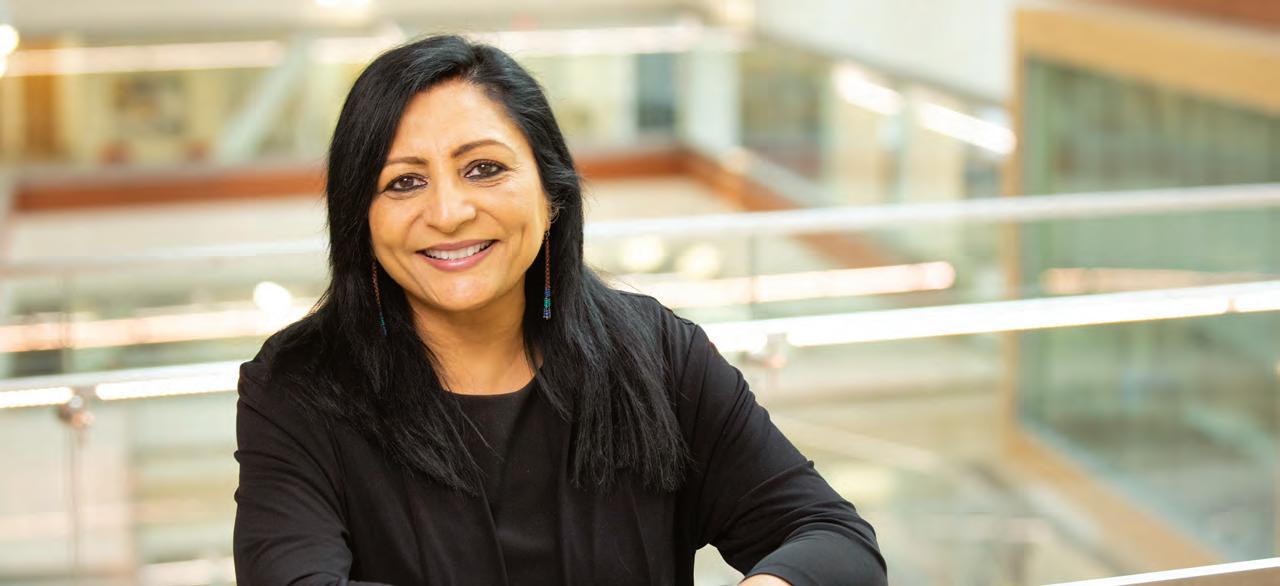
12 minute read
PATHWAYS
by UBAA
UB MED PATHWAYS
Arthur Beyder, MD-PhD ’07, an assistant professor of medicine and physiology and a physician in the Division of Gastroenterology and Hepatology at the Mayo Clinic, has received a NIH Director’s New Innovator Award from the National Institutes of Health. The title of his project is: “Does the Gut Have a Sense of Touch?” The prestigious award, established in 2007, supports unusually innovative research from early career investigators who are within 10 years of their fi nal degree or clinical residency. Beyder received his MD and PhD degrees in 2007 from the Jacobs School of Medicine and Biomedical Sciences, where he did his thesis work with Frederick Sachs, PhD, SUNY Distinguished Professor, one of the founders of the fi eld of mechanosensitive channels. He then joined Beyder
Mayo Clinic’s Clinician Investigator Program, where he completed clinical training in internal medicine and gastroenterology and postdoctoral work with Gianrico Farrugia, MD, a world leader in gastrointestinal physiology and pathophysiology. During this time, Beyder focused on ion channel mechanosensitivity and precision medicine in functional gastrointestinal (GI) disorders, which are common and complex gut-brain disorders, with nearly half the patients having disruptions in GI mechanosensation. Recently, Beyder’s group discovered a novel population of mechanosensitive epithelial sensory cells that are similar to skin’s touch sensors, which prompted a potentially transformative question: “Does the gut have a sense of touch?” Beyder has received K08 and R03 awards from the NIH, and a Research Scholar Award from the American Gastroenterological Association.
REUNION WEEKEND AND SPRING CLINICAL DAY 2020 FRIDAY, JUNE 5 – SATURDAY, JUNE 6, 2020FRIDAY, JUNE 5 – SATURDAY, JUNE 6, 2020
REGISTRATION IS NOW OPEN Events include the all-alumni welcome back reception, building tours, Spring Clinical Day and Distinguished Alumni Awards, and reunion class dinners.
WE ARE PLEASED TO INVITE OUR REUNION CLASSES: Every 5th year class from 1945–2015. FRIDAY, JUNE 5TH All-Alumni cocktail reception SATURDAY, JUNE 6 Spring Clinical Day FEATURING ROY VONGTAMA, MD ’00 Doctor by Day, Actor by Night—alumnus, actor, producer, director and radiation oncologist SATURDAY, JUNE 6–REUNION CLASS DINEAROUNDS For full event details and registration, visit www.medicine.buff alo.edu/reunion
IN MEMORIAM
C. JOHN ABEYOUNIS, PhD ’65, professor emeritus of microbiology, died June 14, 2018, four years after being diagnosed with frontallobe dementia. He was 79. A native of North Carolina, Abeyounis completed his doctorate in microbiology at UB in 1965. After serving a postdoctoral fellowship at the Arthritis Foundation, he joined the medical school’s faculty as an instructor in the Department of Microbiology. In 1969 he was named an assistant professor and associate director of graduate studies, and in 1972 was named director. Abeyounis was promoted to full professor in 1977 and retired in 2000. Under his leadership the graduate program fl ourished and attracted students and fellows from all over the world. He was a highly respected mentor known for stressing rigor and reproducibility in research and as someone whom students could look to for professional guidance. Abeyounis’ research resulted in the publication of many papers, with later studies focusing on the then-emerging fi eld of transplantation immunology.
HERBERT E. JOYCE, MD ’45 —A founding father of family medicine in Bu alo
Herbert E. Joyce, MD ’45, a founding father of family medicine in Buff alo and a leading fi gure in the establishment of family medicine as a specialty, died October 25, 2019, at his home in Canterbury Woods, Williamsville. He was 98.
Following graduation from UB medical school in 1945, Joyce served in the United States military, retiring in 1960 as a lieutenant colonel in the Air Force.
In 1951, he founded the Highgate Medical Group PC, one of the largest family medicine groups in New York State. In the ensuing years, he was instrumental in the early movement to promote family practice as a specialty. Joyce and other family practitioners in Buff alo deserve much credit for the creation of the second-oldest family practice residency in the United States, the Deaconess Family Practice Residency. They also are credited with establishing a Department of Family Medicine at UB, among the fi rst of 15 university departments in the United States.
Joyce was a professor of family medicine at UB from 1970 to 1993, and served as interim chair of the Department of Family Medicine from 1982 to 1983. He was president of the local American Academy of General Practice from 1959 to 1960, and president of the New York State Chapter of the American Academy of Family Physicians (AAFP) from 1974 to 1975.
In later years, he served as president of the Medical Society of the County of Erie. A community leader, he also continued to volunteer in social, medical, educational and political organizations within and outside of the Jacobs School of Medicine and Biomedical Sciences.
He received numerous awards over the years, including the President’s Award in 1987 from the American Academy of Family Physicians; the Max Cheplove Medal in 1993, the highest honor awarded by the Erie County Chapter of the New York State Academy of Family Physicians; the Dean’s Award for service to the Jacobs School of Medicine and Biomedical Sciences; and the 2009 Distinguished Medical Alumnus Award, also from the Jacobs School.
Contributions in memory of Herbert E. Joyce, MD can be made to the Department of Family Medicine Endowment Fund, c/o University at Buff alo Foundation, P.O. Box 730, Buff alo, NY 14226-0730.
KEVIN B. KULICK, MD ’76, a dermatologist in private practice and later with Buff alo Medical Group, died February 25, 2019, of pancreatic cancer. He was 68.
A native of Buff alo, Kulick earned his bachelor’s degree from Wesleyan University in Middletown, Connecticut, then attended medical school at UB, followed by two years of residency in family practice and a three-year residence in dermatology, both at UB. In his fi nal year of residency at UB, he worked in a research lab studying lupus erythematosus.
Kulick then spent a year doing research with the Oklahoma Medical Research Foundation in Oklahoma City. He returned to Buff alo and spent the next two years researching at UB as a Dr. Henry C. and Bertha H. Buswell Fellow, a program that selects early-career medical doctors who will pursue careers as physician-scientists.
In 1981, Kulick began part-time private practice as a dermatologist and in 1984, he began a full-time private practice. He maintained an offi ce on Delaware Avenue in the Town of Tonawanda for 25 years. In 2009, he joined Buff alo Medical Group, with an offi ce on Essjay Road in Williamsville, until he stopped practicing due to illness. Certifi ed by the American Board of Dermatology, Kulick was a fellow in the American Academy of Dermatology.
UB MED PATHWAYS
HAROLD J. LEVY, MD ’46 —Prominent psychiatrist, philanthropist, educator
Harold J. Levy, MD ’46, of Canterbury Woods, a physician leader, teacher and philanthropist, died October 2, 2019, in Millard Fillmore Suburban Hospital after a short illness. He was 94.
A Buff alo native, Levy was the only child of Evelyn Sperling and Sidney H. Levy, MD, a pioneering radiologist and a 1915 graduate of the Jacobs School of Medicine and Biomedical Sciences.
Levy graduated in UB medical school’s centennial class of 1946, becoming, at age 21, its youngest graduate and youngest inductee to the local chapter of the Alpha Omega Alpha Honor Medical Society.
Levy completed his internship, residency and fellowship at the old E.J. Meyer Memorial Hospital, now Erie County Medical Center.
Levy was certifi ed in psychiatry by the American Board of Psychiatry and Neurology in 1955. He was the fi rst physician to complete a research fellowship in psychosomatic medicine at UB, refl ecting a lifelong interest in the mind-body connection. In 1968, Levy was named chief of psychiatry at Millard Fillmore Hospital, a post he held for more than 30 years. He also was medical director at Bry-Lin from the 1950s through the 1980s.
For more than 50 years, Levy taught UB medical students and psychiatry residents. At the time of his death, he was emeritus clinical associate professor of psychiatry at the Jacobs School of Medicine and Biomedical Sciences.
A founder of the WNY Psychiatric Association, Levy was a Distinguished Life Fellow of the American Psychiatric Association. He was a past president and a board member of the UB Medical Alumni Association.
After graduating from medical school, Levy donated to UB every year except for the two years he was in the Army. He chaired his medical school class reunions, including his 70th reunion in 2016. At his 65th reunion, he was presented a Medical Alumni Association Lifetime Achievement Award. The Dean’s Conference Room in the Jacobs School of Medicine and Biomedical Sciences is named for Dr. and Mrs. Levy. Levy also endowed a fund through the UB Department of Psychiatry to encourage research in psychosomatic medicine, and personally supervised residents working on such projects. In addition, he endowed an undergraduate scholarship, a lecture and a conference fund in the UB Department of Jewish Thought.
Levy is survived by his wife of 61 years, Arlyne G. Levy; three sons, Sanford (MD ’86), Richard and Kenneth; and six grandchildren.
ROCCO C. VENUTO, MD ’67, professor of medicine, a former chief of the Division of Nephrology and a leading researcher on chronic kidney disease and treatment, died July 11, 2019, at his home in Williamsville, New York. He was 77.
A UB alumnus and physician with UBMD Internal Medicine who cared for generations of chronic kidney disease patients in Western New York, Venuto’s name had been synonymous with the fi eld of nephrology in Buff alo and nationwide for half a century. He was seeing and caring for patients up until the day he died.
Venuto contributed signifi cantly to research focused on how to improve care for kidney patients, whether they were being medically managed or were transplant recipients. An internationally recognized expert on hypertension in pregnancy, his research contributed signifi cantly to the understanding of the pathophysiology of preeclampsia.
A tireless advocate for organ donation, in 2011 he received a Lifetime Achievement Award from Upstate New York Transplant Services, which he co-founded.
He and his UB colleagues collaborated on studies that revealed the inadequacy of early detection and treatment of chronic kidney disease, and he was an advocate for earlier diagnosis.
As division chief of nephrology, Venuto partnered with UB’s Institute for Healthcare Informatics in a major New York State-funded study of kidney disease that utilized big data in order to improve the care of chronic kidney disease patients in Western New York.
As medical director of renal transplant and director of the chronic kidney disease program at Erie County Medical Center (ECMC), he treated patients, as he put it, “with virtually every aspect of kidney disease,” from those undergoing dialysis to those receiving transplants. He also cared for high-risk pregnant women with renal dysfunction at Oishei Children’s Hospital.
He collaborated with researchers from ECMC and UB’s School of Pharmacy and Pharmaceutical Sciences to improve the clinical impact of medications used in transplant immunosuppression regimens.
INCREDIBLY Motivated
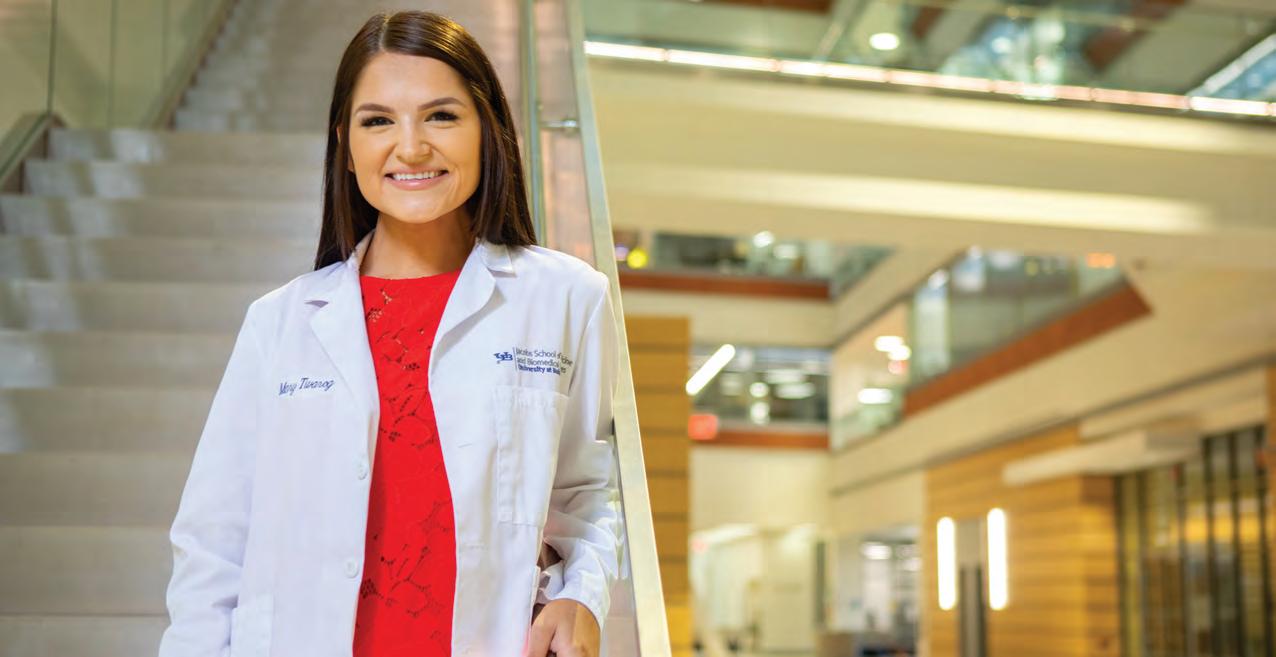
Mary Twarog, a 2019 Western New York Medical Scholarship recipient
By S.A. Unger
When Mary Twarog learned that she had been awarded a Western New York Medical Scholarship, which covers the majority of her medical school tuition, she thought of her hometown of Buff alo and what she could give back to it in the years ahead.
“To me, the scholarship represents the faith Buff alo has in me and in the medical education I am receiving at UB, which is incredibly motivating,” says Twarog, Class of 2022.
The Western New York Medical Scholarship Fund, now in its fi fth year, provides four-year scholarships to local students to attend the Jacobs School of Medicine and Biomedical Sciences. The goal is to train and retain more doctors in the eight counties of Western New York, stemming a steady decline in the number of physicians who practice here.
Scholarship recipients are awarded about $30,000 annually and must pledge to practice in Western New York for fi ve years upon fi nishing medical school and resident training. The highly selective criteria require recipients to have excelled academically, to have graduated from a high school in the eight-county region of Western New York and to have demonstrated fi nancial need.
Twarog was raised in a tight-knit family of fi ve children. Her mother worked as a pharmacist and her father as a deputy in the U.S. Marshal’s Offi ce. Both volunteered extensively in the community. “They taught me the importance of going above and beyond to care for everyone around you,” Twarog says.
When her father was shot in the line of duty, Twarog “was truly moved by how the community rose to help him, including the doctors and other health care professionals who helped him get back to work.”
Twarog is grateful that the scholarship provides her with an opportunity “to go into any fi eld of medicine without concern for the great burden of loans I would have originally had.”
Determined to work with pediatric patients, she is hoping to pursue subspecialty training—a hope that stems from experience she gained during a gap year, when she worked as an endocrinology research assistant at UBMD Pediatrics.
“I was inspired every day by the children and teenagers in Western New York growing up with serious chronic illnesses who showed more grace and resilience than I could have imagined possible,” she says. “It would be an honor to someday provide care for such a special group of children.”
UB Medicine University at Buffalo 916 Kimball Tower Buffalo, NY 14214-8028
Nonprofit Org. U.S. Postage PAID Buffalo, NY Permit No. 311
My Bold Moment

Amandip Cheema, third-year Jacobs School of Medicine and Biomedical Sciences student
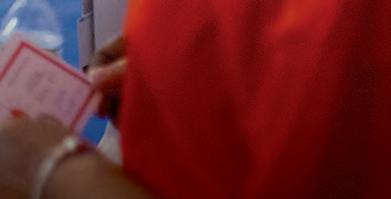
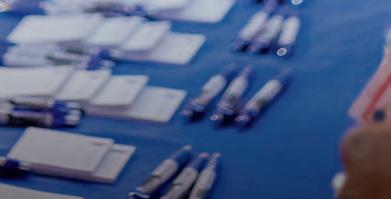
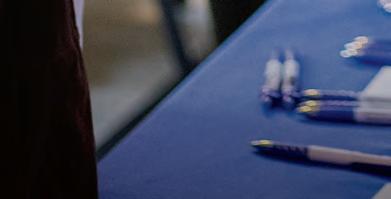
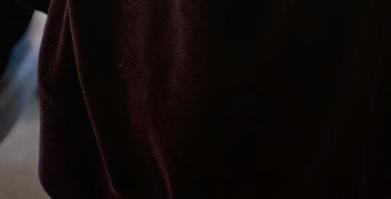

Bold means keeping communities healthy. Whether it’s providing free health care to our uninsured neighbors, alleviating Western New York’s physician shortage, or pioneering the discovery of life-saving treatments, we make a huge impact on our community and around the globe. The Boldly Bu alo campaign provides countless opportunities for students to discover their passions and achieve their dreams. To learn how you can help create a better world, visit bu alo.edu/campaign.



